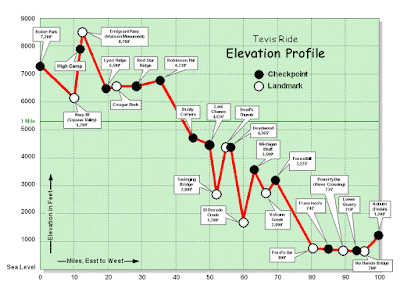Make no mistake. You and your horse need to be fit and prepared for the dramatic climbs and descents: 19,000 feet of "up" and 22,000 feet of "down" according to the Tevis Cup website.
But it is doable! Julie Suhr says: A Tevis completion does not require a super horse with a super rider. It requires a well conditioned horse of almost any breed with a rider who has her head screwed on right and a big dream inside it.
Here are a few tips I got from my mentors:
1. Make time where you can.
Some places you have to walk, so if you can trot, even just a few feet, you trot. So practice walk/trot transitions at home.
We walked most of the downhills on foot, leading the horses. The footing is quite rocky in some places and I had to pay close attention to my own feet. We jogged a bit where the trail flattened out. The descent from Deadwood to El Dorado felt like an eternity.
 |
| My shoes at after doing the canyons between Robinson and Foresthill. |
We rode most of the uphills, but had to stop a few times to let the horses catch their breath. I understand that some riders tail their horses uphill through the first canyons.
The climb to Devil's Thumb was the toughest. The trail passed through an area burnt by the fire, and it was like a fairy forest with white mushrooms growing on the blackened trees.
2. Be aware of the riders around you and be strategic about when to wait and when to move on.
There is lots of trail where you cannot pass. So you could get caught behind a group of slower horses.
Luckily, there was a small place suitable for passing, so we went by and made our way to Pucker Point.
 |
| This picture taken just before Pucker Point, as I was keeping both hands on the steering wheel! |
When we arrived at Last Chance vet gate and go, there were only a few riders there. We watered the horses and let them eat a bit and suddenly a big group arrived and a long vet line started to form. We hustled over and got in line, so we could get through and out on trail as soon as possible.
Parts of the trail leaving Robinson Flat were very dusty, so we slowed down a bit to stay back of the dust.
So you can see how easy it would be to lose precious time if you are not aware of what is happening around you.
3. Stay hydrated and keep your horse cool!
It was hot and a bit humid for the Tevis Ed Ride this year, but compared to the heat and humidity we ride in in Ontario, not too bad. However, sometimes it can be brutally hot in the canyons, and the rock sucks up the heat and warms up like an oven.
Make sure you carry ample water for yourself and some extra to squirt on your horse's neck. Lots of riders also had scoops and sponges. One mentor named Jeff, had 2 bottles of water in his pommel pack and 2 in his cantle pack for him to drink. He wore a camelback and has perfected the ability to suck a mouthful of water and spit it on to his horse's neck. So his horse was being cooled the whole way!
 |
| That's Jeff at the left of the photo. |
 |
| My wonderful Day 2 mentors: Rebecca and Brooke :) |
 |
| Scorch, just before he decided to take me swimming! Photo: R. Florio |
4. Keep your eyes on the road!
A lot of the time, it felt like we were on a goat track on the edge of the mountain. Before I left, a friend cautioned me not to look down! But I couldn't help it. It was a long way down! So then I would take a quick glimpse out and up to admire the view, and then quickly focused back on the trail. You really have to ride every stride.
 |
| Wish this had turned out better, but I guess I was in a hurry to get my eyes back on the trail! |
I love this shot. It reminds me of all the work done by the Western States Trails Committee and my friend, Steve, who turned my recurring Tevis dream into a reality.
So you may have noticed that I have not discussed the Bridges at all yet. No Hands Bridge and the Swinging Bridge (my biggest fear going into the Tevis Ed Ride). Stay tuned for Chapter 3 of Living the Dream: the Tevis Educational Ride Report...
 |
| No Hands Bridge |
 |
| Swinging Bridge |











Thank you for posting this :)
ReplyDelete